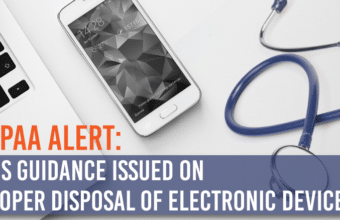Compliance
-
Can Your Old Data Rise from the Dead?
As a business owner, you know you have a legal and ethical obligation to protect the sensitive, personal data your customers entrust to you. Complying with privacy laws at the federal, state, and local level (not to mention industry standards spelled out in HIPAA, FACTA, and so on) is not a suggestion – it’s mandatory […]
read more -
Essential Components of Your ITAD Solution
IT asset disposition, or ITAD, is a crucial part of any company’s digital security plan. Unfortunately, many businesses don’t give ITAD the same attention as setting up digital data protections like firewalls, antivirus programs, encryption, monitoring, and so on. While it is important to keep current, usable data safe, it doesn’t eliminate the need to […]
read more -
Electronic Data Destruction and the Chain of Custody
When you decide to upgrade to new hardware and get rid of outdated computer equipment, it is essential that you do so in keeping with all applicable environmental and privacy laws, so as to protect yourself, your clients, and the environment. This means developing policies and working with partners that create a clear chain of […]
read more -
How and Why You Need to Create a Remote Work Policy for Your Business
The remote workforce is growing in leaps and bounds. Many workers enjoy the luxury of working from home, managing their own time, and avoiding a lengthy daily commute. Employers who use a remote workforce can reduce the expense of office space and utilize contract workers instead of adding to their overhead with the salaries and […]
read more -
4 ITAD Prep Tips in the Financial Services Sector
Just a few decades ago, IT asset disposition (ITAD) wasn’t on the average business’s radar. But today, advances in technology have put the issue front and center. The vast majority of companies now rely on some form of computer technology, from cell phones, to POS systems, all the way up to complex databases. Although proper […]
read more -
HIPAA ALERT: HHS Issued Guidelines on e-Device Disposal
The United States Department of Health and Human Services (HHS) recently issued guidance on how to properly dispose of electronic devices to prevent data breaches. Healthcare organizations are prime targets for data breaches. Often times, detailed security plans are put in place to protect networks from online vulnerabilities, but they fail to cover offline equipment with […]
read more -
Risk Mitigation for Data Asset Destruction
There are known risks to storing data in digital formats. If your firewall isn’t robust, your password protections are weak, you’ve decided to forego encryption, and so on, you place yourself at risk of data breach, identity theft, and damage to your customers and your company. What you might not realize is all the risks […]
read more -
Using a Hard Drive Shredder: 4 Common Mistakes to Avoid
The migration to digital data is still underway, but by now, most businesses prefer the convenience and space-saving benefits of storing data on hard drives rather than keeping filing cabinets and storage warehouses full of paper records. The caveat, of course, is that business owners have to take steps to keep digital data safe. In […]
read more -
New Data Breach Law in South Dakota
As of this month, every state in the U.S. now has a data breach notification law. Just yesterday, South Dakota‘s first ever data breach notification law went into effect (July first). What do South Dakota Businesses Need to Know (The Takeaways) Personal Information and Protected Information Defined: “Personal Information” consists of a person’s first name or first […]
read more














